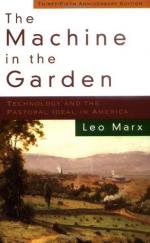
|
| Name: _________________________ | Period: ___________________ |
This test consists of 15 multiple choice questions and 5 short answer questions.
Multiple Choice Questions
1. What does Marx relate Shakespeare's 'The Tempest' to?
(a) Natural spirituality.
(b) Political intrigue.
(c) Indigenous people.
(d) American colonization.
2. America was depicted as a paradise that was also what, in Marx's account?
(a) A refuge.
(b) A source for good in the Old World.
(c) A place of hardship.
(d) A place of redemption.
3. What was the opposite of Barlowe's experience in his travels?
(a) Political intrigue.
(b) Sparse resources and unsafe territory.
(c) Rocky soil and harsh laws.
(d) Storms and primitive land.
4. What sources does Marx suppose Shakespeare read for 'The Tempest'?
(a) Accounts of African tribes.
(b) Accounts of travel to the Pacific islands.
(c) Accounts of travel to India.
(d) Accounts of travel to the New World.
5. What part of 'The Tempest' held special interest for Marx?
(a) The portrait of indecision about taking the throne.
(b) The portrait of love's frailty against political power.
(c) The portrait of an unspoiled landscape invaded by Europeans.
(d) The portrait of men who gain power by disposing of natural resources.
6. In what art does Marx see pastoral ideology contributing to a more realistic outcome for American society?
(a) Sculpture.
(b) Music.
(c) Literature.
(d) Painting.
7. What is the second stage of life that Marx describes through Shakespeare's 'The Tempest'?
(a) Return to nature.
(b) Return to the city.
(c) Life in the city.
(d) Life in nature.
8. What did the new world fail to offer newcomers, in typical accounts?
(a) Art.
(b) Wealth.
(c) Power.
(d) Civilization.
9. What does Marx point out was formed as a result of the Revolutionary War?
(a) Opposition to expansion.
(b) An industrial capacity.
(c) Filthy cities.
(d) Corrupt government.
10. What did the settlers find appealing about the New World?
(a) Everything was free for the taking.
(b) It was theirs by right of conquest.
(c) It was unsoiled by civilization.
(d) They could buy land so cheap from the natives.
11. When did a uniquely American pastoral image emerge?
(a) Nineteenth century.
(b) Seventeenth century.
(c) Eighteenth century.
(d) At colonization.
12. What economic consequence does the sentimental pastoral ideal engender?
(a) Farm subsidies.
(b) Regulation of speculative investments.
(c) Tariffs on imported manufactured goods.
(d) Low taxes.
13. How did the first settlers see Virginia, in Beverly's history?
(a) As a pestilential swamp.
(b) As a desert.
(c) As a purgatory.
(d) As a promised land.
14. In Jefferson's time, how did the eastern farmers come to see nature, as a result of their work?
(a) As a new nature.
(b) As an improved nature.
(c) As a domestic industry.
(d) As a raw material.
15. Which leisure activity does Marx identify as revealing the influence of the sentimental pastoral ideal?
(a) Hiking.
(b) Flying.
(c) Travel.
(d) Theatre.
Short Answer Questions
1. When did Robert Beverly write his history of Virginia?
2. What does Marx say Shakespeare's 'The Tempest' demonstrates?
3. How had feelings about nature changed by Jefferson's time?
4. What is the first stage of life that Marx describes through Shakespeare's 'The Tempest'?
5. How did Arthur Barlowe describe America?
|
This section contains 532 words (approx. 2 pages at 300 words per page) |

|




